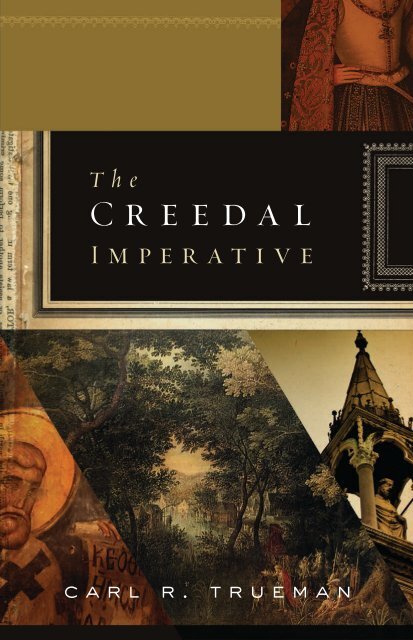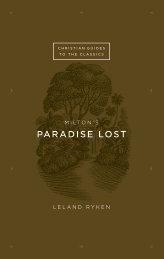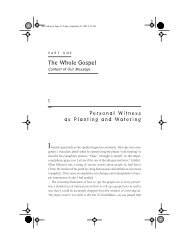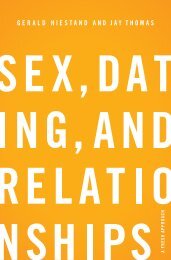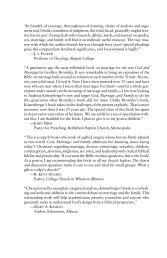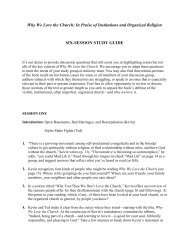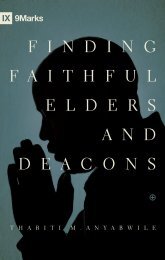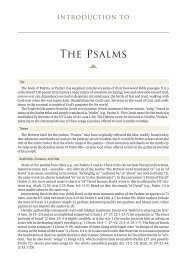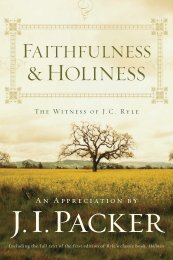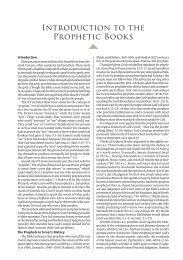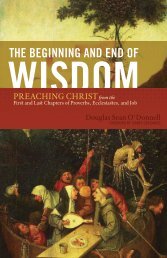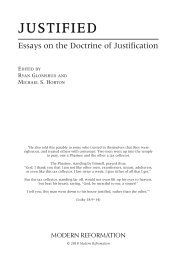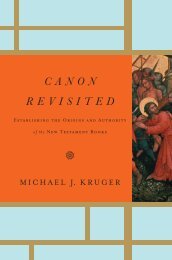The reedal - Monergism Books
The reedal - Monergism Books
The reedal - Monergism Books
Create successful ePaper yourself
Turn your PDF publications into a flip-book with our unique Google optimized e-Paper software.
“It is commonplace among many church leaders to dispute the need for confessions offaith on the grounds of the supreme authority of the Bible. In this timely book, Truemandemonstrates effectively how such claims are untenable. We all have creeds—the Bibleitself requires them—but some are unwritten, not open to public accountability, and theconsequences can be damaging. Trueman’s case deserves the widest possible hearing.”Robert Letham, Director of Research, Senior Lecturerin Systematic and Historical <strong>The</strong>ology, Wales Evangelical School of <strong>The</strong>ology;author, <strong>The</strong> Holy Trinity and Union with Christ“In its creeds and confessions, the church affirms its allegiance to the God of thegospel and commits itself to think, speak, and govern its life in ways shaped by thegospel. This lively book, full of vigorous argument and biblical good sense, tells us why.”John Webster, Professor of Systematic <strong>The</strong>ology, University of Aberdeen“<strong>The</strong> apostle Paul once told Timothy that a minister was to be kind, able to teach,patient, and gentle (2 Tim. 2:24). In <strong>The</strong> C<strong>reedal</strong> Imperative, Carl Trueman demonstratesthat he is not only able to teach the Word and how it has come down to usthroughout history, but also how to do so with kindness, patience, and gentleness—precisely the qualities that are needed to convince in our creedless, ahistorical, andshallow age. As one whose entire ministry of preaching, teaching, and writing hasbeen taken up with the Word as confessed in the great creeds and confessions ofChristendom, I wholeheartedly recommend this book.”Daniel R. Hyde, Pastor, Oceanside United Reformed Church, Oceanside, California;author, God in Our Midst; Welcome to a Reformed Church; and Why Believe in God?“Herein is a truly inspiring vision, that churches be freed from the vapid, the fickle, andthe dysfunctional by a deeper enjoyment of the faith we have received. Trueman hasshown that use of the creeds is both necessary and beautifully enriching. Informativeand compelling, this book has what it takes to do great good.”Michael Reeves, Head of <strong>The</strong>ology, Universities and Colleges Christian Fellowship(UCCF); author, Delighting in the Trinity and <strong>The</strong> Unquenchable Flame“I know of few people better equipped to write this book. As both a scholar and apastor, Trueman combines his expertise as a historian with some important biblicalobservations to make a convincing case for <strong>The</strong> C<strong>reedal</strong> Imperative. This book willprove to be immensely useful in today’s ecclesiastical climate.”Mark Jones, Senior Minister, Faith Vancouver Presbyterian Church;coauthor, A Puritan <strong>The</strong>ology“Trueman, again, has given us a stimulating book. He manages to demonstrate therelevance of creeds by showing how new the old ones are. <strong>The</strong> book is not only amust-read for those who stick to creeds without knowing why or those whose creedit is to have no creed, but for everyone who tries to practice the Christian faith.”Herman Selderhuis, director Refo500, <strong>The</strong> Netherlands
“This is an engrossing survey, sparklingly contemporary yet eruditely historical. Butit is also an urgent wake-up call, which, if heeded, would deliver Evangelicalism fromits current isolation, shallowness, and confusion—and from the autocracy of privateempire-builders. Informative, readable, and stimulating all at once.”Donald Macleod, Emeritus Professor of Systematic <strong>The</strong>ology,Free Church of Scotland College“Trueman states that creeds and confessions are both necessary for the well-being ofthe church and are, in fact, required by the Bible. His arguments are wide-ranging andinclude biblical exposition, lessons from church history, and modern cultural factorsthat may be unconsciously influencing one’s view of the issue. In addition, there isthe typical Trueman humor and odd examples sprinkled throughout the book. In theend, I agree with him and will require this book for my seminary course on creeds.”Robert J. Cara, Chief Academic Officer, Hugh and Sallie ReavesProfessor of New Testament, Reformed <strong>The</strong>ological Seminary“Today there is a challenge to the authority of the church including the authority ofScripture. <strong>The</strong> C<strong>reedal</strong> Imperative speaks to the necessity of creeds and confessions,which tend to save us from attempts to privately interpret the Scripture. Truemandemonstrates how creeds and confessions are strategic checkpoints, intended not onlyto enable us to express our beliefs, but also to keep us from misunderstanding God’struth. Properly used, creeds and confessions, under the authority of God’s Word,enable us to hear God’s voice—they are our speaking what we understand God hasspoken to us in Scripture. For those who maintain, ‘We have no creed or confessionbut the Bible,’ this book is a must-read. For those who understand the place of creedsand confessions in the life of Christian faith, this book is also a must-read. It is allabout understanding God’s truth. I commend Trueman for his careful demonstrationof clear exegesis, sound theology, understanding of church history, and, consequently,his ability to understand the times in which we live. You will be blessed by this book.”Charles H. Dunahoo, Coordinator, PCA CEP;author, Making Kingdom Disciples; Changing Trends in Missions;and Foundation and Authority“Though it might sound a bit hackneyed for a book commendation, this is a book Iwould love to have written! Carl Trueman’s case for what he terms ‘the c<strong>reedal</strong> imperative’of the Christian faith is spot-on. Trueman not only identifies but also deftly rebutsa number of traditional as well as more recent objections in contemporary culture tocreeds and confessions. On the one hand, he shows the untenability of the ‘no creedbut Christ, no book but the Bible’ position of many evangelical Christians. And on theother hand, he defends the use of creeds and confessions that summarize and defendthe teaching of Scripture without supplementing Scripture or diminishing its authority.”Cornelis P. Venema, President, Professor of Doctrinal Studies,Mid-America Reformed Seminary
<strong>The</strong> C<strong>reedal</strong> ImperativeCopyright © 2012 by Carl R. TruemanPublished by Crossway1300 Crescent StreetWheaton, Illinois 60187All rights reserved. No part of this publication may be reproduced, stored in a retrieval system, ortransmitted in any form by any means, electronic, mechanical, photocopy, recording, or otherwise,without the prior permission of the publisher, except as provided for by USA copyright law.Cover design: Studio GearboxCover images: ThinkstockInterior design and typesetting: Lakeside Design PlusFirst printing 2012Printed in the United States of AmericaScripture quotations are from the ESV® Bible (<strong>The</strong> Holy Bible, English Standard Version®),copyright © 2001 by Crossway. Used by permission. All rights reserved.Trade Paperback ISBN: 978-1-4335-2190-4PDF ISBN: 978-1-4335-2191-1Mobipocket ISBN: 978-1-4335-2192-8ePub ISBN: 978-1-4335-2193-5Library of Congress Cataloging-in-Publication DataTrueman, Carl R.<strong>The</strong> c<strong>reedal</strong> imperative / Carl R. Trueman.p. cm.Includes bibliographical references and index.ISBN 978-1-4335-2190-4 (tp)1. Creeds. I. Title.BT990.T78 2012238—dc23 2012013405Crossway is a publishing ministry of Good News Publishers.VP 24 23 22 21 20 19 18 17 16 15 14 13 1214 13 12 11 10 9 8 7 6 5 4 3 2 1
ContentsAcknowledgments 11Introduction 121 <strong>The</strong> Cultural Case against Creeds and Confessions 212 <strong>The</strong> Foundations of C<strong>reedal</strong>ism 513 <strong>The</strong> Early Church 814 Classical Protestant Confessions 1095 Confession as Praise 1356 On the Usefulness of Creeds and Confessions 159Conclusion 187Appendix: On Revising and Supplementing Confessions 191For Further Reading 199Index 201
IntroductionA colleague of mine loves to tell the following story about a churchhe used to visit. <strong>The</strong> pastor there had a habit of standing in the pulpit,seizing his Bible in his right hand, raising it above his head, andpointing to it with his left. “This,” he declared in a booming voice,“is our only creed and our only confession.” Ironically, the churchwas marked by teaching that included the five points of Calvinism,dispensationalism, and a form of polity that reflected in broad termsits origins as a Plymouth Brethren assembly. In other words, while itsonly creed was the Bible, it actually connected in terms of the detailsof its life and teaching to almost no other congregation in the historyof the church. Clearly, the church did have a creed, a summary view ofwhat the Bible taught on grace, eschatology, and ecclesiology; it wasjust that nobody ever wrote it down and set it out in public. That isa serious problem. As I shall argue in subsequent pages, it is actuallyunbiblical; and that is ironic and somewhat sad, given the (no doubt)sincere desire of the pastor and the people of this church to have anapproach to church life that guaranteed the unique status of the Bible.<strong>The</strong> burden that motivates my writing of this book is my belief thatcreeds and confessions are vital to the present and future well-being ofthe church. Such a statement may well jar with evangelical ears thatare used to the notion that Scripture alone is to be considered the sole,supreme authority for Christian faith and practice. Does my claimnot strike at the very heart of the notion of Scripture alone? Does itnot place me in jeopardy of regarding both Scripture and something12
Introductionoutside Scripture, some tradition, as being of coordinate and potentiallyequal authority? And is there not a danger that commitment totime-bound creeds and confessions might well doom the church toirrelevance in the modern world?<strong>The</strong>se are, indeed, legitimate concerns, and I intend to address these,and more, in the coming pages. Here, however, I want to place my owncards on the table. Every author writes from a particular perspective,with arguments shaped to some extent by personal commitments,background, and belief. Thus, it seems entirely appropriate to allowthe reader insight into my own context and predispositions in orderto be better prepared to understand what I am going to say.I am a professor at a confessional Presbyterian seminary, Westminsterin Philadelphia, and a minister in a confessional Presbyteriandenomination, the Orthodox Presbyterian Church. In other words, Iam a confessional Presbyterian. <strong>The</strong> terms “confessional” and “Presbyterian”are crucial for understanding both institutions. To take thelatter term first, “Presbyterian” means that I am committed to a Presbyterianform of church government, whereby the church is ruledat a congregational level by a session, or committee, of elders; at aregional level by a presbytery of ministers and elders drawn from thechurches in the area; and at a national level by a General Assemblyof ministers and elders drawn from all parts of the country. When Ibecame a minister in my denomination, I took vows to uphold thisform of government both in what I teach and in the respect I give tothe various courts of the church.More significant for this book is the adjective “confessional.” Thismeans that I am committed to the idea that the Presbyterian confessionalposition, as stated in the Westminster Standards, represents asummary of the teaching of the Bible on key points such as who Godis, who Christ is, what justification means, and so on. When I becamea minister, I took a solemn vow to that effect. This points to anotheraspect of being confessional: my vows connect to a structure of churchgovernment such that, if I am found to be teaching something inconsistentwith what I am pledged to uphold, I can be held to account. Ifnecessary, in the worst situations, I can even be removed from publicoffice in the church.13
IntroductionNotice, I said above that my vow reflects the fact that I believe thestatements in the Westminster Standards are a summary of Scripture’steaching, not that I believe the Westminster Standards to representteaching supplemental to Scripture, or independent of it. Rather, theysummarize what is already there in Scripture itself.Now, this position is not without its problems. How, one might ask,do I avoid making the Standards a kind of a priori framework intowhich Scripture is made to fit? In other words, is there not a dangerhere of tail wagging dog, of treating the summary as the grid by whichI read Scripture? I will address these, and similar, questions later. Atthis point, my purpose is simply to let readers know the position thatI occupy so they can understand the perspective from which this bookis being written. In sum, I not only believe that creeds and confessionsare good for the church, I am also committed by vow to uphold theteaching of a particular confession. This indicates that the status ofcreeds and confessions is not for me simply a matter of intellectualinterest; I am committed to the notion at a deep, personal level.<strong>The</strong> fact that I am a confessional Christian places me at odds withthe vast majority of evangelical Christians today. That is ironic, becausemost Christian churches throughout the ages have defined themselvesby commitment to some form of creed, confession, or doctrinal statement.This is the case for the Eastern Orthodox, for Roman Catholics,and for Lutheran, Reformed, and Anglican Protestants. Some streamsof Baptists have also had confessions; and many independent churchestoday that may not think of themselves as confessional have briefstatements of faith that define who they are and what they believe.Furthermore, as I shall argue later, even those churches and Christianswho repudiate the whole notion of creeds and confessions will yet tendto operate with an implicit creed.Despite this, it is true to say that we live in an anticonfessional age, atleast in intention if not always in practice. <strong>The</strong> most blatant examples ofthis come from those who argue that the Protestant notion of Scripturealone simply requires the rejection of creeds and confessions. Scriptureis the sole authority; of what use therefore are further documents? Andhow can one ever claim such documents have authority without thusderogating from the authority of Scripture? <strong>The</strong>se arguments have a14
Introductioncertain specious force, but I will argue in chapters 1 and 2 that, whilethe reasons for anticonfessionalism are manifold, many of them aredriven more by cultural forces of which too many are unaware. Awarenessof these forces, by contrast, may not automatically free us fromtheir influence but can at least offer us the opportunity of subjectingthem to critique.I do want to make the point here that Christians are not dividedbetween those who have creeds and confessions and those who donot; rather, they are divided between those who have public creedsand confessions that are written down and exist as public documents,subject to public scrutiny, evaluation, and critique, and those who haveprivate creeds and confessions that are often improvised, unwritten,and thus not open to public scrutiny, not susceptible to evaluation and,crucially and ironically, not, therefore, subject to testing by Scriptureto see whether they are true.Anticonfessionalism among evangelicals is actually closely related totheir putative rejection of tradition. For many, the principle of Scripturealone stands against any notion that the church’s tradition plays anyconstructive role in her life or thought. Some regard this as one of theprincipal insights of the Protestant Reformers: Rome had (and has)tradition; Protestantism has Scripture. <strong>The</strong> sixteenth-century Reformationwas thus a struggle over authority, with church tradition beingpitted against the supremacy of Scripture; and modern evangelicalsstand in lockstep with their Protestant forebears on this matter.A few moments of reflection, however, indicate how misleadingand, in fact, untrue is the claim that Protestants have the Bible ratherthan tradition. Most evangelicals, for example, will typically use Bibletranslations, and such translations, be they the NIV, RSV, ESV, or KJV,stand within established traditions of Bible translation, linguistics,lexicography, etc. Further, beneath these translations lie the originalHebrew and Greek texts; so traditions of textual understanding alsounderlie these translations and, even for those linguistic geniuses whoare more comfortable with just the Hebrew and Greek, these varioustraditions will shape the choice of text, the way the languages werelearned, and the kind of choices made on matters of obscure grammar,15
Introductionsyntax, and vocabulary. Thus, “Scripture alone,” whatever else it means,cannot mean Scripture approached in a vacuum.And we can take this reflection on tradition a step further. All Protestantpastors, even the most fundamentalist, will, if they are remotelycompetent, prepare their sermons with the help of lexicons, commentaries,and books of theology. As soon as they take down one ofthese books from their bookcases and start to read it, of course, theyare drawing positively on church tradition. <strong>The</strong>y are not simply readingthe Word of God; they are reading the thoughts and reflectionson that Word offered by someone else and articulated using words,sentences, and paragraphs that are not found anywhere in the Bible.Indeed, as soon as one uses the word “Trinity” from the pulpit, one isdrawing on tradition, not Scripture.In fact, tradition is not the issue; it is how one defines that tradition,and how one understands the way it connects to Scripture, which arereally the points at issue. Indeed, this was the crux of the Reformation,which was not so much a struggle between Scripture and tradition asbetween different types of traditions. In a famous exchange betweena leading light of the Catholic Reformation, Cardinal Sadoleto, andthe Reformer, John Calvin, Sadoleto argued that the Protestants hadabandoned the church tradition. Calvin responded that, on the contrary,the Protestants had the true tradition; it was the Catholic Church thathad moved away from the truth. <strong>The</strong> point was simple and well-made:the tradition that transmitted the correct understanding of Scripturefrom generation to generation belonged to the Protestants.Here is not the place to debate the veracity of Calvin’s claim regardingthe content of tradition; suffice it to note that he understoodthe Reformation not as Scripture versus tradition but as scripturaltradition versus unscriptural tradition. Thoughtful Protestants then,and ever since, have understood the Reformers as arguing for whatwe might call a tradition that is normed by Scripture. In other words,Protestants know that they use language and conceptual terminologynot found explicitly in the Bible; but they understand such are usefulin understanding what Scripture says and, at the point where they arefound to be inadequate for this task, or even to contradict Scripture,there they must be modified or abandoned.16
Introduction<strong>The</strong> same is true of the creeds and confessions of the church, whichare, one might say, the most concentrated deposits of tradition, asaffirmed by the church. <strong>The</strong>se documents are often referred to as normednorms or, to use the Latin, norma normata, in contrast to Scripturewhich is the norming norm, or norma normans. What that means isthat the creeds and confessions represent a public statement of whata particular church or denomination believes that Scripture teachesin a synthetic form. By synthetic, I do not mean “false,” as in, say, asynthetic fiber like nylon, which is designed to look like cotton butis not really cotton. I mean rather a presentation that is not simply acollection of Bible verses but rather a thematic summary of what theBible teaches. Thus, in the Nicene Creed, we have an explication of theidentity of God as Father, Son, and Holy Spirit, which is consideredto represent what the Bible as a whole teaches on this subject. <strong>The</strong>important point to note is that such statements are public, and thusopen to public scrutiny in the light of what Scripture teaches. Thus,they can be accepted or rejected, modified or clarified, as and whenthey are found to be wanting; the context and means for such changewe will discuss elsewhere. Here, I simply want the reader to note thesynthetic and public nature of the documents.This book consists of six chapters. In chapter 1, I look at some ofthe powerful currents within modern culture that serve to make thewhole idea of creeds and confessions somewhat implausible. I do notintend to reduce evangelical objections to such secular forces, but Ibelieve that an understanding of such forces can be of great help inclarifying why the case for confessionalism can be difficult to makeat the present time.In chapter 2, I look at the biblical teaching on a number of relatedpoints (the importance of language, the reality and unity of humannature, Paul’s emphasis on doctrine, on eldership, on a “form of soundwords,” and on tradition). My conclusion is not only that creeds andconfessions are plausible, given biblical teaching, but that Paul actuallyseems to assume that something like them will be a normal part of thepostapostolic church’s life. In other words, there is a sense in whichthe claim to have no creed but the Bible is incoherent, given the factthat the Bible itself seems to teach the need for creeds.17
IntroductionIn chapter 3, I outline the ecclesiological developments of relevanceto the case for creeds and confessions. In particular, I focus on the Trinitarian/christologicaldiscussions between the Council of Nicaea in 325and the Council of Chalcedon in 451. I also touch on the Apostles’ andthe Athanasian creeds. Two important lessons I draw from this studyrelate to doctrinal complexity and the importance of the church. Asto the former, history teaches that many Christian doctrines can onlyexist in a stable form within a relatively complex network of relateddoctrines. Christian theology, in other words, always has a certainineradicable complexity, which has serious implications for the modernevangelical predilection for simple and very brief statements of faith.As to ecclesiology, it is clear from the early church that terms such as“heresy” really only have a meaningful content when connected to achurch that has a specific confession.In chapter 4, I deal with major Protestant confessional standards:the Anglican Articles and Homilies; the Lutheran Book of Concord;the Three Forms of Unity; the Westminster Standards; and the 1689Baptist Confession of Faith. This chapter is of necessity highly selective.Protestantism has produced a vast amount of confessional material,and so I have chosen to focus on those with which I am mostfamiliar. In choosing these, I do not intend to imply that Arminians,General Baptists, Anabaptists, and others do not have confessions andcannot be confessional. I hope that anyone from these traditions whoreads this book will see that the principles of confessionalism are notconfined simply to those confessions I happen to have mentioned.In chapter 5, in order to do justice to the doxological origins ofChristian creeds and to underline the important function that suchhave played, and can continue to play, in the life of the church, I focuson creeds and praise. Too often we think of these documents in a negativesense, as if their sole purpose was simply to keep people out ofthe church and to offer a dry-as-dust account of the Christian faith.By contrast, creeds are central to Christian doxology.In chapter 6, I make the case for the usefulness of confessions byhighlighting a number of advantages to having them, from limitationof church power to a proper pedagogical structure for church life.18
IntroductionAfter the conclusion, I also include an appendix, addressing the vexingquestion of the possibility and practicality of confessional revision.In writing this book, I come to my subject as one convinced thatconfessional Christianity captures a very important aspect of biblicalteaching on the church. I was an evangelical for many years; discoveringconfessional Presbyterianism in my early thirties was a liberating experience.Nevertheless, I am aware that there can be a rather distasteful,not to mention sinful, tendency among many confessional writers tolook down with scorn and derision on those who are not confessional.I trust that I have not written in that spirit; rather, I hope that thisbook will go some way to persuading nonconfessional Christians wholove the Bible and seek to follow Christ that confessionalism, far frombeing something to fear, can actually help them to better protect thatwhich is so dear to them.<strong>The</strong> astute reader should now be able to see the case I want to makein this book: I want to argue that creeds and confessions are thoroughlyconsistent with the belief that Scripture alone is the unique sourceof revelation and authority. Indeed, I want to go somewhat further:I want to argue that creeds and confessions are, in fact, necessary forthe well-being of the church, and that churches that claim not to havethem place themselves at a permanent disadvantage when it comesto holding fast to that form of sound words which was so precious tothe aging Paul as he advised his young protégé, Timothy. Linked tothis latter point, I want to make the case that it is at least arguable,based on Scripture, that the need for creeds and confessions is not justa practical imperative for the church but is also a biblical imperative.19
1<strong>The</strong> Cultural Case against Creedsand ConfessionsIn the introduction, I briefly mentioned the standard, knee-jerk reactionagainst creeds and confessions, often found in evangelical circles,that such documents supplant the unique place of the Bible, placetradition on an equal—or even superior—footing with Scripture, andthus compromise a truly evangelical, Protestant notion of authority.While I will offer a more thorough response to this line of objectionlater, I did note that all Christians engage in confessional synthesis;the difference is simply whether one adheres to a public confession,subject to public scrutiny, or to a private confession that is, by its verynature, immune to such examination.Before proceeding to a more thoroughgoing exposition of theuse and the usefulness of confessions, however, it is worth spendingsome time reflecting on other reasons why creeds and confessions areregarded with such suspicion these days. While the objection to themis often couched in language that appears to be jealous for biblicalauthority, there are also powerful forces at work within our modernworld that militate against adherence to historic statements of theChristian faith. As the goldfish swimming in the bowl is unaware ofthe temperature and taste of the water in which he swims, so often21
<strong>The</strong> C<strong>reedal</strong> Imperativethe most powerfully formative forces of our societies and cultures arethose with which we are so familiar as to be functionally unaware ofhow they shape our thinking, even our thinking about what exactlyit means to say that Scripture has supreme and unique authority. Itwould be a tragic irony if the rejection of creeds and confessions by somany of those who sincerely wish to be biblically faithful turned outto be not an act of faithfulness but rather an unwitting capitulationto the spirit of the age. It is some of the forces that shape this spiritthat I address in this chapter.Three AssumptionsMy conviction that creeds and confessions are a good and necessarypart of healthy, biblical church life rests on a host of different argumentsand convictions; but, at root, there are three basic presuppositions towhich I hold that must be true for the case for confessions to be asound one. <strong>The</strong>se are as follows:1. <strong>The</strong> past is important, and has things of positive relevance to teachus. Creeds and confessions are, almost by definition, documents thatwere composed at some point in the past; and, in most cases, we aretalking about the distant past, not last week or last year. Thus, to claimthat creeds and confessions still fulfill positive functions, in termsof transmitting truth from one generation to another or making itclear to the outside world what it is that particular churches believe,requires that we believe the past can still speak to us today. Thus, anycultural force that weakens or attenuates the belief that the past canbe a source of knowledge and even wisdom is also a force that servesto undermine the relevance of creeds and confessions.2. Language must be an appropriate vehicle for the stable transmissionof truth across time and geographical space. Creeds and confessions aredocuments that make theological truth claims. That is not to say thatthat is all that they do: the role, for example, of the Apostles’ and theNicene creeds in many church liturgies indicates that they can alsofulfill doxological as well as pedagogical and theological roles; butwhile they can thus be more, they can never be less than theological,doctrinal statements that rest upon and express truth claims about Godand the world he has created. <strong>The</strong>y do this, of course, in words; and22
<strong>The</strong> Cultural Case against Creeds and Confessionsso, if these claims are to be what they claim to be—statements abouta reality beyond language—then language itself must be an adequatemedium for performing this task. Thus, any force that underminesgeneral confidence in language as a medium capable of conveyinginformation or of constituting relationships is also a force that strikesat the validity of creeds and confessions.3. <strong>The</strong>re must be a body or an institution that can authoritatively composeand enforce creeds and confessions. This body or institution is thechurch. I will address the significance of this in more detail in subsequentchapters, but it is important to understand at the outset thatconfessions are not private documents. <strong>The</strong>y are significant becausethey have been adopted by the church as public declarations of herfaith, and their function cannot be isolated from their ecclesiasticalnature and context. This whole concept assumes that institutionsand institutional authority structures are not necessarily bad or evilor defective simply by their very existence as institutions. Thus, anycultural force that overthrows or undermines notions of external orinstitutional authority effectively removes the mechanisms by whichcreeds and confessions can function as anything other than simplesummaries of doctrine for private edification.If these are the presuppositions of confessionalism, then it is clearthat we have a major problem, because each of these three basic presuppositionsrepresents a profoundly countercultural position, somethingthat stands opposed to the general flow of modern life. Today, thepast is more often a source of embarrassment than a positive sourceof knowledge; and when it is considered useful, it is usually as providingexamples of what not to do or of defective, less advanced thinkingthan of truth for the present. Language is similarly suspect: in aworld of spin, dishonest politicians, and ruthless marketing, languagecan often seem to be—indeed, often is—manipulative, deceptive, ordownright wicked, but rarely transparent and something to be takenat face value. <strong>The</strong>n, finally, institutions, from multinational corporationsto governments, seem to be in the game of self-perpetuation,bullying, and control for the sake of control. <strong>The</strong>y are never seen asentities that exist in practice for the real benefit of others. Thus, the big23
<strong>The</strong> C<strong>reedal</strong> Imperativethree presuppositions of confessionalism fly in the face of the valuesof contemporary culture, and confessionalists clearly have their workcut out to mount a counterattack. And such a counterattack beginswith the simple truism of every successful campaigner, from wartimeleaders to the coaches of high school track teams: know your enemy.In this context, knowing the enemy may also help us to realize how,in our defense of the unique authority of Scripture, our understandingof what that means is sometimes shaped more by the hidden forces ofthe world around us than by the teaching of Scripture and the historiclife and practice of the church.Devaluing the PastScienceNumerous forces within modern culture serve to erode any notionthat the past might be a useful source of wisdom. Perhaps the mostobvious is the dominance of science. I am not, of course, referring tothe content of science. Science undergirds almost all of those thingswhich make life bearable, from electric lightbulbs to cancer treatment.To say science is the enemy is not, in this instance, to be antiscience.Rather, I am thinking of the kind of cultural mindset that sciencehelps to cultivate and reinforce.Science, by its very nature, assumes that the present is better thanthe past and the future will be better than the present. Again, this isnot in itself a bad thing. It is surely part of what drives the laudablecuriosity that motivates scientists and leads to major breakthroughs;and there is much evidence that this—the fact the present is betterthan the past—is, indeed, the case. As one who teaches history, I amoften asked by students in which period of history I would most haveenjoyed living. My answer is simple and straightforward: this one,the here and now. Call me a weakling if you like, but I would muchrather live in an era with analgesics, antibiotics, and flush toilets thanin earlier periods where pain killers were unknown, medicine usuallyinvolved swallowing some kill-or-cure snake oil made by a wrinkledold crone with dubious personal hygiene, and the “facilities” were littlemore than a hole in the ground on the edge of the village. By and large,in areas where it is relevant, science has made the world a better place.24
<strong>The</strong> Cultural Case against Creeds and Confessions<strong>The</strong> evidence is not all one way, however: the Holocaust, for example,is one instance where science was clearly used to destroy rather thanenhance life, and that on a huge scale. But, by and large, science hasbrought with it huge gains, from medicine to dishwashers.<strong>The</strong> problem is that science also comes loaded with a certain philosophicalbias, and that is, as stated above, that the past is inferior to thepresent. It has a built-in narrative of progress, whereby everything—orat least almost everything—just keeps getting better; and the problemis that this tends to inculcate a broader cultural attitude that applies thesame kind of expectation in other areas. Throw concepts like evolutioninto the mix, and you have a gravitational pull within the culturetoward the future, built on the assumed inferiority of the past.This narrative of scientific progress instills a belief not simply in thesuperiority of the present in relation to the past but also in its uniqueness.This time in which we live has so much more knowledge, displaysso much more sophistication, and is so much more complicated thanthe past. Thus that past is consequently of no real use in addressingthe problems or issues of the present, so great is the difference betweenthem. One would not, for example, use a horse and cart to transport fuelfrom an oil refinery to a petrol station. Nor would one today consult aseventeenth-century textbook on surgery to find out how to removea burst appendix. So why would one turn to some confession writtenin the fourth or the seventeenth century to find a summary guide towhat Christians today should believe?Some years ago, I was exposed to precisely this attitude while teachinga class on the ancient church. At some point, I mentioned thata certain professor from another institution was going to be visitingcampus to deliver some lectures on the Westminster Standards, thatis, the Confession and the Larger and Shorter Catechisms. A studentimmediately asked why she should bother attending these because“some documents written in the seventeenth century seem to havevery little to do with” her ministry. I asked her if she had read theseapparently irrelevant documents recently. She said she had not. I thenpointed out to her that these documents had been regarded by manypeople as vital and vibrant expressions of the Christian faith since theircomposition. Given this, and their connection to historic traditions and25
<strong>The</strong> C<strong>reedal</strong> Imperativetrajectories of church life and Christian thought, I suggested with everyounce of tact and gentleness I could muster that she might perhapsbetter ask herself not so much what relevance they have to her ministrybut what relevance her ministry had to the church. Her assumptionwas simple: the past could not really speak in any meaningful way tothe present. She was truly a child of the scientific age.TechnologyClosely related to the role of science in cultivating an attitude thatdowngrades the importance of the past is that of technology. A simpleexample should make this point clear. My mother lives in an old weaver’scottage in the Cotswolds. In what is now her living room, there is astone fireplace and, in that fireplace, there are a series of small holes,roughly an inch in diameter, now plugged with wood, which indicatewhere the weaver would have had his loom. It is easy to imagine ascene in the early nineteenth century in which the weaver was hard atwork making cloth when one of his children wandered into the roomand inquired as to what exactly he was doing. No doubt, the weaverwould have sat the child down and explained how the loom operated,how the shuttle carried the woolen thread from one side to the otherand slowly but surely formed a sheet of fabric. <strong>The</strong> flow of knowledgefrom the older generation to the younger was clear; this was no doubtrepeated many times in preindustrial societies around the world, wherechildren typically grew up to follow in the footsteps of their parents andwere thus more or less apprenticed to their parents from an early age.Now, jump forward nearly two hundred years to a scene in the sameroom. I am sitting there, trying to set up my mother’s DVR to record aGloucester versus Leicester rugby match and, try as I might, I cannotget the machine to do what I want it to do. In walks my niece andasks what I am trying to do. After I explain to her what is going on,she sighs, rolls her eyes, picks up the remote control, and with whatseems to me to be two touches of the buttons, has the machine set upto record the match. With a shake of her head, she walks back intothe kitchen.Notice what has happened here, and what the significance of thesetwo encounters is: the flow of knowledge has been reversed. No longer26
<strong>The</strong> Cultural Case against Creeds and Confessionsis the younger dependent upon the older; rather, the older is dependentupon the younger. Technology, because it is constantly and rapidlychanging, inevitably favors those who have been brought up with it,and who have the kind of young, agile minds that develop new skillsquickly and easily. You cannot easily teach a middle-aged historian,any more than an old dog, new tricks; and that means that technologywill always favor the young.This is just one anecdote and, as my secretary will tell you, I amamong the more—ahem—technologically challenged men of my generation;but the general point is a good one. <strong>The</strong> technological world,particularly given the rapidity with which it is constantly changing,creates an environment where the assumption is that older people aregoing to be dependent upon the younger. Taken by itself, perhaps, thismight not be so significant; but combined with the impact of scienceas a whole upon cultural attitudes, it undoubtedly plays its role in thebias against age, and thus against the past, which is a hallmark of themodern world and which is not incidental in the general antipathyamong Christians for creeds and confessions.ConsumerismA third cultural force that militates against respect for the past is consumerism.As with science, there is much that could be said here, butI will restrict myself to the most salient aspects of the phenomenon.Consumerism can be defined as an over-attachment to materialgoods and possessions such that one’s meaning or worth is determinedby them. This definition is reasonably helpful but misses onekey aspect of the phenomenon: it is not just the attachment to materialthings, it is also the need for constant acquisition of the same.Life is enriched not simply by possessing goods but by the process ofacquiring them; consumerism is as much a function of boredom as itis of crass materialism.What has this to do with rejection of the past? Simply this: consumerismis predicated on the idea that life can be fulfilling throughacquiring something in the future that one does not have in the present.This manifests itself in the whole strategic nature of marketing.For example, every time you switch on your television set, you are27
<strong>The</strong> C<strong>reedal</strong> Imperativebombarded with advertisements that may be for a variety of differentgoods and services but that all preach basically the same message: whatyou have now is not enough for happiness; you need something else,something new, in order to find true fulfillment. I believe that thisreinforces fundamentally negative attitudes toward the past.Think for a moment: how many readers of this book are wearingclothes they bought ten years ago? How many are using computersthey bought five years ago? Or driving automobiles more than fifteenyears old? With the exception of vintage car collectors, the economicallypoor, and those with absolutely no fashion sense, most readerswill probably respond in the negative to at least one, if not all three,of these questions. Yet when we ask why this is the case, there is nosensible answer. We can put a man on the moon, so we could probablymake an automobile that lasts for fifty years; most of us do little oncomputers that could not have been done on the machines we ownedfive years ago; and we all throw away clothes that still fit us and arequite presentable. So why the need for the new?A number of factors influence this kind of behavior. First, thereis the role of built-in obsolescence: it is not in the manufacturer’sbest interest to make a washing machine that will last for a hundredyears. If that were done, then the manufacturer would likely be out ofbusiness within a decade as the market became saturated. Such is apossible, but actually unlikely, scenario. Developments in technologymean that longevity will not be the only factor driving the market.Efficiency, for example, or enhanced and multiplied functions mightwell create a continuing need for more goods. Aesthetics also play arole; the ability to market goods based on aesthetics and image hasproved powerful. Remember the cool, sleek look that Apple computersdeveloped at one point? That gave them a clear edge over their rivals.Second, and related to the first point, we see in the consumer economya coalescence of aesthetics and a bias to the young in the creationof the so-called youth market, and the closely related marketing ofyouth to older types like myself. If no eighteen-year-old male believeshimself to be mortal, so no middle-aged male wants to appear to beany older than he was twenty years ago. Indeed, with the exception ofthose odd types (of the kind who read <strong>The</strong> Daily Telegraph in the UK28
<strong>The</strong> Cultural Case against Creeds and Confessionsand the National Review in the US) who were probably born withcomb-overs, receding hairlines, and bottle glasses, it would seem thatthe market for youth clothing (albeit with slightly expanded waistlinesizes) is alive and well long into territory previously reserved for thesuperannuated and beyond.In today’s topsy-turvy world, youth has status. That is why so manyold-timers spend large amounts of money and time trying to hold onto, or even win back, some of its accoutrements, whether by purchasinga pair of jeans from Aeropostale, buying a male grooming kit, or evenundergoing drastic plastic surgery. Harmless as these phenomena are atone level, at another they are part of the larger cultural impulse towarddisdain for the past and for old age. We see this not just in fashion, ofcourse, but also in the “wisdom” now invested in young people whoare considered competent to opine on complex matters, not despitethe fact of their relative youth and inexperience but precisely becauseof it. Pop music, a function of youth culture if ever there was one, isperhaps responsible for this. In the last few decades, we have had thepleasure of hearing all manner of people, from Hall & Oates in theeighties to Lady Gaga in the present, telling the world what to doabout everything from apartheid to third world debt to gay marriage.Apparently, the lack of “baggage” (to use the standard pejorative) is anadvantage to being able to speak with authority on complex subjects.In other professions, of course—from plumbing to brain surgery andbeyond—“baggage” is generally referred to as “appropriate training,”but, such is the power of a youthful smile, a full head of hair, and a trimwaistline that such does not apply to matters of morality, economics,or the meaning of life in general.As a postscript, the impact of consumerism is one reason why churchsessions and elder boards often spend more time than is decent ondiscussions about worship and programs. Someone will make thepoint that certain young people have left because the worship is notto their liking and thus the church needs to think again about how itdoes things. Laying aside the fact that, for most of us, no church givesus everything we want in worship but we are nonetheless happy toattend because the Word is truly preached, it is interesting to note thesession member’s response: we need to do something, to think again29
<strong>The</strong> Cultural Case against Creeds and Confessionshuman nature is really a construct of the particulars of a specifichistorical, geographical, and cultural context, it is not immediatelyobvious that, say, a document produced in Constantinople near theend of the fourth century can have any relevance to people living inLondon or New York at the start of the twenty-first. For historicaldocuments to speak beyond their own time there has to be somekind of fundamental continuity between their form and content andthe present age.Consumerism plays its part here as well. If you are what you consume,if you can be whatever you want to be, then what binds you toyour neighbor? More importantly, what binds you to the people inother times and places? If you are master of your own destiny, then youare free to act toward the past and toward other people in the sameway you act toward the goods on the supermarket shelf. You buy whatappeals to you and leave behind that which does not.<strong>The</strong> implications for creeds and confessions are obvious. Chooseyour particular: they were written by dead, white males who dresseddifferently to us, had different attitudes to the world, spoke in a differentlanguage, were celibate, were not celibate, never understood technologyor listened to Elvis, never grappled with the scientific breakthroughs ofrecent years, etc., etc. If nothing binds us to them, or if the differencesbetween us and them simply overwhelm any analogy there might bebetween us, then they have nothing useful or relevant to say to us,and we are better off ignoring them. A world in which human natureis merely a construct put together by the individual or by the specificcommunity in which the individual is placed is a world where historicaldocuments, such as creeds, can have no transcendent significance butare doomed to be of merely local or antiquarian interest.Words, Mysticism, and PragmatismIf devaluing the past is one aspect of contemporary culture that militatesagainst the usefulness of creeds and confessions, a second is thecurrent suspicion of words as reliable means of communication.We need to acknowledge at the outset that there is plenty of evidencefor the problematic nature of words. To quote <strong>The</strong> Police: “Poets,31
<strong>The</strong> C<strong>reedal</strong> Imperativepriests and politicians have words to thank for their positions.” 1 <strong>The</strong>idea that words are one way to establish and maintain personal powerand prestige is deeply rooted. Indeed, a whole school of literary theoryhas developed around this notion, whereby words have become littlemore than tools to be used to marginalize and manipulate others. Iremember some years ago watching a 1930s Nazi propaganda filmentitled Sein ohne Leben (“Being without Life”), which was designedto make the case that children born with severe mental and physicaldisabilities should be euthanized. <strong>The</strong> documentary was significantin that it helped pave the way for the social and cultural context inwhich the broader policies of the Holocaust could be pursued. Butwhat interested me in particular was the way it used those two words—“being” and “life”—as a means of making a manipulative distinctionthat served to obscure the horror of what was really being proposed.By implying that a child with severe encephalitis possessed a mereexistence and no life, by driving that wedge between the two, the childwas effectively and quietly robbed of personhood and thus of status.<strong>The</strong> words were not being used to convey information; they were beingused to create a reality and one that, in the wake of the Holocaust,looks vile and manipulative.One could add to this many examples drawn from the sphere ofpolitics, perhaps the most notorious realm for such linguistic twisting.In short, the case for words being susceptible to manipulative usageis not one that can be credibly questioned. Such has led to a broadercultural cynicism about language, which has bled over into the church.That Christianity is a way of life and not a set of propositions hasbecome something of a mantra among younger Christians in the lastten years. Of course, like most erroneous notions, it contains just enoughtruth and has just enough legitimate criticism of alternative positionsto be credible. Indeed, one of its underlying concerns—that Christianitynot terminate in a mere intellectualism—is surely legitimate,even if the sweeping terms in which this is expressed clearly involvean unbiblical reduction of Christianity to praxis. It is not actually thatoriginal: Desiderius Erasmus, Richard Baxter, and Adolf von Har-1<strong>The</strong> Police, “De Do Do Do, De Da Da Da,” Zenyattà Mondatta, December 5, 1980.32
<strong>The</strong> Cultural Case against Creeds and Confessionsnack, to name but three, all offered variations (of differing degrees oforthodoxy) on this theme. Yet the frequency with which it occurs inthe history of the church indicates that at least some of the concernsit seeks to address must be legitimate.In addition to the obvious problems with the way language hasbeen used by people such as politicians, and how sophisticated literarytheorists have dismantled old linguistic certainties, there is also apopular strain of mysticism (for want of a better word) that pervadesmodern culture and that is profoundly suspicious of words. This takesvarious forms. One thinks, for example, of the notion that certainemotional sentiments or responses constitute truth, something thatis often epitomized by the kind of statements made with remarkableregularity on TV talk shows. “I just know in my heart that it is true” isbuilt on this kind of thinking. Many of us no doubt have encounteredethical argumentation that amounts to, or perhaps is even expressedas, “It feels so good. How can it possibly be wrong?” 2Again, we might turn to popular music to provide a summary ofthis kind of thinking. If the reader will forgive the obvious incoherenceof using words to undermine confidence in words, here are a few linesfrom Madonna’s song, “Bedtime Stories”:Words are useless, especially sentences.<strong>The</strong>y don’t stand for anything.How could they explain how I feel?Madonna actually makes quite a profound point here: the modernemphasis on emotions as the locus of truth or, to use the trendierterm, authenticity, is fundamentally non- and even antiverbal. Whensomeone declares that they “just know in their heart” that the latestboy band is the greatest phenomenon of Western musical culture sinceBach left the organ loft for the last time, you may know that they aretalking arrant nonsense, but there is no way that you can refute thisperson’s claim because it is not a claim expressed using public criteria2For all of the plausibility of such emotive arguments in modern culture when it comesto, say, teenagers sleeping together, we still live in an age when thankfully this is not yetconsidered a plausible justification for serial killers.33
<strong>The</strong> C<strong>reedal</strong> Imperativecommonly known as words and logic. It is a purely personal, subjectivejudgment; and, in its claim to truth, it makes truth something mystical,something to be experienced, not something subject to normal criteriaof public evaluation.To have such an attitude so deeply embedded in popular culture,whether pop songs or talk shows or the visceral level of public discourseone often witnesses on the television in scenes outside courthouses,political rallies, and sporting events, would in itself create plenty ofdifficulties for the notion of creeds and confessions. Yet we see theimpact of suspicion of words even within the Christian church. At theReformation, preaching came to supplant the Mass as the central act ofcorporate Christian worship; underlying this shift was a move towardan understanding of the gospel as promise and of salvation as beingby faith in that promise. Thus, proclamation of that promise in wordsmoved to center stage. In recent decades, however, many churches haveshifted preaching from this central place. In some contexts, preachinghas not been abandoned; rather, it has been relativized and now standsalongside dramatic performances, candles, incense, and small groupdiscussion. In other contexts, preaching has been pushed completelyaside for conversational discourse, where the authoritative voice of thepreacher has been replaced by a more democratic dialogue. Underlyingall these shifts, in practice if not always in terms of self-consciousplanning, is a suspicion that proclaimed words are no longer a reliableauthority or, perhaps better, a plausible authority, given the widerantiverbal cultural dispositions.Populist suspicion of words is not the only point at which the antiverbalmystical emphasis bites the church. Such also has deep andhighly sophisticated roots within the history of modern theology. Forexample, this kind of mysticism is analogous to the kind of revision ofthe notion of Christian theology that took place at the hands of F. D. E.Schleiermacher, the so-called Father of Liberalism, at the start of thenineteenth century. In the wake of the Enlightenment, and particularlyin response to Immanuel Kant’s critique of traditional epistemologies,Schleiermacher sought to rebuild the Christian faith in a manner thatwould be plausible in his context. As the notions of objective truth andof the possibility of generalizing universal truths from the particulars34
<strong>The</strong> Cultural Case against Creeds and Confessionsof history had been abandoned, Schleiermacher offered an account ofChristian theology which understood doctrine not so much as statementsabout the nature of God as a description of religious psychology.Thus, for example, predestination ceased to be what it appeared onpaper to be—a statement about God’s eternal purpose relative to menand women—and became rather a poetic expression of the feeling oftotal dependence upon God as experienced by the religious individual.Further, Christ became supremely important as the incarnation of Godnot because he was the incarnate God in the traditional manner definedby the Chalcedonian Definition of 451, but rather because in him theconsciousness of God was supremely manifested.Within such a framework, then, propositional, doctrinal Christianity(and the creeds and confessions that epitomized it) wasexchanged for something mystical and experiential. Of course, totar this with the label “liberalism” is likely to precipitate an immediatereaction from self-styled conservative evangelicals. Liberalism isthe enemy; it is what “they” hold to—whoever “they” are—and notsomething of which we are guilty ourselves. Yet mysticism is alive andwell within evangelical circles. Anyone who has ever been told by afriend that the Lord led such a friend to do something completelysilly, or anyone who has ever been at a Bible study where the burdenhas been to explain “what the text means to me,” regardless of whatthe words on the page and the grammar and syntax might otherwiseindicate, has experienced an evangelical mysticism that is not reallydistinguishable from traditional liberalism at the level of its understandingof what constitutes truth.Closely allied to mysticism is another phenomenon lethal to confessionalChristianity: pragmatism, the notion that truth is to be foundin usefulness. When one reflects for a moment on talk-show stylemysticism, this becomes obvious. When individuals on such showsdeclare that “I just know in my heart that this is true,” what they areoften saying is, “This belief works for me; it has some actual, practicalresult that I like.” Whether the belief makes them more cheerful,or helps them to feel more important, or gives them hope for bettertimes ahead, the important thing is not so much the content of thebelief as its result.35
<strong>The</strong> C<strong>reedal</strong> ImperativeAntiauthoritarianismIf there are deep forces within our culture that militate against creedsand confessions on the basis of their nature as historical and linguisticdocuments, there are also forces that strike deep at these documents interms of their origin and their status. Creeds and confessions are, bydefinition, statements made by institutions (churches), and they derivetheir practical authority from their connection to such institutions. Itis true that some confessions have a single author. <strong>The</strong> Belgic Confession,written by the French Protestant Guido de Bres, is one obviousexample; but it possesses its authority because it has been adoptedby a church as an authoritative document. In the case of the BelgicConfession, this adoptive action was taken by the Synod of Dordt,which met in 1618–1619 in the city of Dordrecht in the Netherlands.It is the sanction of a corporate body that gives the confession its legalecclesiastical status, not the specific identity of the author.This institutional aspect of creeds and confessions is culturally problematic.Indeed, if anything marks the contemporary world it is surelysuspicion of external authority. One might generalize and say that theissues noted above, with science, technology, consumerism, language,mysticism, and pragmatism, are all variations on the theme of rejectionof external authority, that of the past in the case of science andtechnology, and that of anything but the self in terms of consumerism,language, and the rest.Of course, this rejection of external authority is ultimately ratherselective. While many today reject traditional forms of external authority(family hierarchies, civil governments, traditional moral values,etc.), those same people often accept rather uncritically other forms ofexternal authority. Think, for example, of the mindless emulation of thefashions of pop stars by their fans; or the incredibly naïve confidencethat is often placed in the opinions of vacuous and ill-informed celebritieson, say, third world debt or global warming, as opposed to thoseof traditional experts. Youth culture is the same: why on earth wouldanyone want the opinion of the latest boy band on anything unlesshe was convinced that knowledge gained by experience, knowledgefrom “out there,” was actually a hindrance to truth and not a means ofaccessing it? Yet the blogs and the news media crave the views of the38
<strong>The</strong> Cultural Case against Creeds and Confessionslikes of Lady Gaga on all kinds of things of which they are technicallyignorant and actually incapable of expressing themselves withany coherence or thoughtfulness. <strong>The</strong>y are authorities not because oftheir knowledge or skills but because of their status in our modernconsumer society; and the fact that they are relatively young (or liketo think that they are, as in the case of the superannuated Bono) isstrangely seen as a plus, an advantage, something that qualifies them tomake these statements. As I noted above, it is hard to imagine applyingthe same criteria to, say, electricians or brain surgeons, where ageand experience are typically seen as essential qualifications. Strangeto tell, on the bigger questions and problems of the world and society,having “relevant training and knowledge” is more likely to earnone excoriation as “an ivory tower academic” or part of the dreaded“establishment” than a useful contributor to any proposed solution.Lady Gaga is apparently more likely to have the answer to humansexuality or third world debt than a minister or an economist. Arguably,therefore, the rejection of external authority needs to be carefullydefined as the rejection of traditional forms of external authority inorder to be an accurate statement.Even with this qualification, however, the church—or at least thetraditional church, with its structures of governance, its establishedways of doing things, and its creeds and confessions—fares badly.Ironically, the old forms of authority have been replaced by new ones;self-appointed gurus abound, as do theological and antitheologicalpotboilers. But my concern is not with passing fads; it is with a recoveringof traditional and, as I will argue, biblical patterns of institutionalauthority.First, however, it is worth spending a few moments examining whyrespect for traditional external authority is at such a pitiable state today.It is clear that the same forces that made consumerism an antihistoricalforce also militate against traditional institutional authority. Consumerismis built upon the notion of the construction of self-identity throughconsumption. Fashions in clothing are a great example of this. Whetherit is the shirt of one’s favorite sports team or a style of dress adoptedby one’s favorite TV or pop star, at the heart of fashion is the notionthat by purchasing certain goods one can create an identity for oneself.39
<strong>The</strong> C<strong>reedal</strong> ImperativeBroadening out from fashion, the world of commercial advertisingis predicated on this kind of self-creating consumption. Commercialsare not simply designed to create dissatisfaction with the present andthus to orient the audience toward the future; they are also designed tosend the signal that you can make yourself different, you can becomethe ideal person you wish to be, by purchasing some particular goodsor services. This is not simply a matter of creating needs; it is alsoabout sending a message that you are master of your own universe.<strong>The</strong> Nike sales pitch, “Just do it!” might as easily be written “Just beit!” for, with a credit card in your pocket, you can become whateveryou want to be. Authority lies within you, or at least that is the messagethe sales and marketing people wish to send; external authorityis merely a repressive force that prevents you from being whoever andwhatever you wish to be.We also see a kind of mysticism and pragmatism in antiauthoritarianism,where the locus of authority is ultimately not anexternal institution or body of knowledge but rather the inner being ofthe person. If “it” is “true for me” because “I just know it in my heart,”then guess what? “My heart,” whether that is a feeling of happinessor of self-esteem or of whatever, is the authority: internal, mystical,appointed by me using pragmatic criteria and as far away from anynotion of direct external or institutional authority as is possible. Ofcourse, it does not take a genius to realize that so many of the things thatwe “just know in our hearts” do actually come from external authorities—commercials,idiotic talk shows, television pundits—but that isnot the point. <strong>The</strong> point is that we do not consciously understand thisor recognize such authorities as having that effect.One further factor that militates against traditional notions ofexternal institutional authority is the Internet, specifically the worldof blogs and tweets. <strong>The</strong>re are, of course, different types of blogs. Imyself do a bit of blogging for an e-zine, reformation21. For me, it issimply an electronic form of traditional journalism. I write articles,and the editor publishes them. One thing that reformation21 does notdo is allow “comments” to be made by random readers on the content.Anyone can write to the editor; and, in the current virtual world, ittakes very little effort to track down an author’s e-mail and send one’s40
<strong>The</strong> Cultural Case against Creeds and Confessionsthoughts straight to the source. But the deregulated posting of publiccomments is not allowed.From my perspective, this is a good thing. I have yet to read a“comments thread” on any topic of significance that does not quicklydegenerate into moronic commentary that is as notable for its vacuousnessas it is for its personal abuse. <strong>The</strong> culture of the commentsthread is one which has confused the right to speak with the right tobe heard and which sends a rather uncritical signal to the world aboutwhat constitutes good argumentation and appropriate contributions todiscussion. Yet the visceral reaction with which such “comment free”e-zines meet from some individuals speaks once again of a culturewhere an anarchic free-for-all apparently is the only acceptable wayof approaching a topic. <strong>The</strong> democratization of discussion in this wayis inimical to traditional notions of authority and to the traditionalnotions of knowledge and expertise which underlie them. Again, wemight note that this is a selective repudiation of authority: I havenever read a comments thread on a blog dealing with brain surgery orrocket science, but I doubt that the good ones in these fields containtoo many comments about “Nazis” or end with remarks like “Fantasticstuff guys !!! J” by people signing themselves off as “Crazydogguy”and the like. Politics and theology are much more likely to attractsuch discourse, it seems, and this surely indicates, and reinforces, thewider cultural problem with the kind of authority associated withtraditional institutions when it comes to what we might term the morephilosophical aspects of life.Of course, it is not just the anarchy of the blogs that plays to thiskind of attitude. <strong>The</strong> arrival of Wikipedia and the like is also significant.Now, I confess that I am something of a Wikipedia fan. It is a fantasticresource for finding out the ages of favorite movie stars and the kindof trivia on a variety of subjects that is most useful when one is takingpart in a pub quiz. <strong>The</strong> problem is that it can give the impression thata subject can be mastered in a very short period of time. I remember afew years ago reading a blog where a person was telling the world thathe had never heard of presuppositional apologetics until that morning,had read the Wikipedia article on the same, and that it had completelychanged his life. Indeed, he may even have specified the time—11:2341
<strong>The</strong> C<strong>reedal</strong> Imperativea.m. comes to mind—at which this earth-shattering change took place.<strong>The</strong> point was ridiculous: whether presuppositional apologetics iscapable of such impact is one question, but that a Wikipedia articlecould provide sufficient information to achieve this is surely unlikely.Were it so, then one could only conclude that all those who reject theposition are either mad, stupid, or have never read the article. A mostunlikely scenario, methinks.What these things—anarchic blog comments, the assumption thatreading a Wikipedia article gives true insight—witness to is the creationof a culture of knowledge in which little weight is placed uponexpertise and the idea that competence in some things only comesafter extended periods of hard work and training. <strong>The</strong>y are thus furtherfactors in the complex of cultural forces that discount traditionalsources of authority—institutions, traditions, etc.—and replace themwith sources that derive their authority from something else, not leastthe hip trendiness of the latest fad or celebrity.It seems clear to me that this anti-institutional tendency is deeprootedeven within churches that, on paper, place a premium onstructure and authority. For example, in my own denomination, theOrthodox Presbyterian Church (OPC), we have a book of churchorder that lays out the basic structures of the church and the proceduresby which these are to be maintained. Office-bearers (ministers,elders, deacons) take strict vows that bind them to particular doctrinalpositions (the Westminster Standards) but also to the denominationand the local congregation. All the office-bearers with whomI have been privileged to serve over the years have taken their vowsvery seriously.What is less often noted, however, is that members, too, take vows.In the OPC these vows are not the same as those of office-bearers. Thisis for good reason; the qualifications for office bearing, as opposed tobeing a member, are somewhat more stringent, as we shall explore ina later chapter. But while the content of the vows for members may beless stringent in terms of specifics, they are no less serious in terms oftheir binding quality. In the OPC they involve profession of faith inthe Trinity, trust in Christ for salvation, and commitment to the localbody and submission under God—a key qualification—to the elders.42
<strong>The</strong> Cultural Case against Creeds and ConfessionsWhat never ceases to amaze me is the casual way in which peoplemake and break membership vows, sometimes within weeks. I haveseen individuals leave the church because they were not given theSunday school teaching opportunities they thought they deserved,because they did not like the worship style, and because their childrenfound a more interesting church elsewhere. That such reasons do notgive any grounds for breaking vows never seems to register. Indeed,some leave without giving any reason at all, so lightly do they regardsolemn vows taken before God and the church.Now, I would never advocate that someone cannot leave a churchat which they are very unhappy; and thankfully, there is provision forpeople to be able to move if they decide to. Cults take away people’sfreedom; the church should never do that. But there are processes bywhich this can be done, typically through discussion with the elders,which actually seek to honor the integrity of the vows. What is strikingis that these processes are, in my experience, rarely used as theyshould be. Often the first thing that the elders hear is that somebodyhas already left and would like a letter of transfer to his new churchor simply to be erased from the membership rolls.What this phenomenon tells me is that the suspicion of, or (perhapsbetter) indifference to, the external authority of institutions is as deeplyembedded in the culture of the contemporary church as it is in society.And such an attitude inevitably has an impact on the way creeds andconfessions are viewed. <strong>The</strong> person who has no real, practical respectfor the church as an institution is inevitably going to have little respectfor the documents that church has produced and/or authorized as partof the basic means by which she identifies herself, witnesses to theworld, and maintains some level of order within her ranks.<strong>The</strong> Fear of ExclusionOne further cultural proclivity worth mentioning is that of the fear ofexclusion, of drawing boundaries such that some people belong andother people do not. In addressing this matter, it is important to notethat much of the tragedy of human history, particularly more recenthistory, has been wrapped up with the problem of exclusion. Oneneed only think of the Armenian genocide of 1915, the Holocaust,43
<strong>The</strong> C<strong>reedal</strong> Imperativethe Rape of Nanking, the Balkan crisis, and the gassing of the Kurdsto understand how vicious some forms of exclusion can be. Racism isonly the most obvious; we can all think of other, less obvious, forms ofexclusion that also help to justify crimes, great and small, perpetratedby one group of human beings against others.Such forms of exclusion have left many with a lasting fear of anythingthat might smack of looking down on others as inferior. In thesilly extremes of political correctness, it almost seems that anything atwhich I choose to take offense is to be deemed oppressive, exclusionary,and on the slippery slope to some form of genocide or holocaust.Yet we must not allow the excesses of the PC types to blind us to thereally genuine concerns that underlie this fear of exclusion; but normust we be blind to the impact it has upon attitudes to things likestatements of faith and confessions.A confession is a positive statement of belief; but in making a positivestatement of belief, it inevitably excludes those who disagree withits content. Even the most tenuous confessions do this: the Unitarianmay claim a creedless faith, but he is never going to invite a Trinitarian,who insists upon the nonnegotiability of the Trinity, to fill his pulpit;Trinitarians are therefore excluded. And if it is true that the creedlessfaith of the Unitarian inevitably excludes some, how much more trueis this of orthodox Christian creeds and confessions? <strong>The</strong> AthanasianCreed is the most spectacular of these as it contains not only positivestatement of Christian doctrine but also anathemas against thosewho disagree with its teaching. It is explicitly, not merely implicitly,an instrument of exclusion.Trajectories of thought that take their cue from traditional Christianliberalism have little or no patience with such exclusivism, of course,because they see doctrinal statements not as transcendent truth claimsbut as expressions of the religious psychology of the individual orthe particular religious community. Whether the inspiration for thisis the kind of Kantian theology of Schleiermacher or the linguisticphilosophy of Wittgenstein, the net result is the same: the truth claimsof one community do not apply in any real or straightforward way toanother; thus the problem of excluding some is localized and limited.44
<strong>The</strong> Cultural Case against Creeds and ConfessionsThis is my truth; tell me yours (to quote the title of the Manic StreetPreachers’ 1998 album).<strong>The</strong> last decade has intensified this fear of exclusion particularlywhen it comes to religion. <strong>The</strong> impact of religiously motivated orreligiously expressed terrorism such as the attack on American institutionson September 11, 2001, has created a cultural atmospherescarcely conducive to exclusive religious truth claims. One can seethis in various responses that have been offered to the rise of allegedreligious radicalism. <strong>The</strong>re is the increasingly commonplace use ofthe catch-all term “fundamentalism” and its cognates that presumablylumps anyone who takes their religion seriously together under thesame scary category, the wild-eyed Jihadist suicide bomber and theaged Amish grandmother. That fundamentalism equals violence isvirtually a given for many.Reaction within the religious world to this cultural moment is interesting.Within Christian circles, the decade after 9/11 saw the rise andfall of the cluster of movements grouped together as the emergentchurch, with its emphasis on Christianity as a way of life, not a set ofdoctrines, and its prioritizing of belonging before believing. This latterslogan, of course, can only make sense if belonging and believing areactually separable in a more than merely formal way. Such a notion is,in the case of many emergent leaders, built on assumed postmodernepistemologies. <strong>The</strong>se are themselves in origin connected to the riseof postcolonialism, with its fear of the hegemony of the white man’sreligion and the imperialist use of Western ideologies, of which Christianityis perhaps the most obvious and historically influential.This fear has meant that a Christianity that is committed to truthclaims which apply beyond the community of faith or which excludecertain people from that community is profoundly at odds with thecultural current. Strange to tell, we do still live in societies that routinelyexclude people. <strong>The</strong> fact that prisons are full to bursting indicatesthat society still considers some forms of behavior to be unacceptableand demands their exclusion from mainstream social life. Legislationagainst discrimination on the basis of race, creed, or sexual orientationindicates that some views are beyond the pale, and those whohold them are not to express them in practical terms in the public45
<strong>The</strong> C<strong>reedal</strong> Imperativesphere. Yet religion, particularly traditional religion, finds itself at acultural moment where it is feared because it dares to say that somebeliefs and practices are true and good while others are false and bad.Such a moment is scarcely conducive to any form of c<strong>reedal</strong>ism orconfessionalism.One further, and perhaps unusual, example of this fear of exclusionis the phenomenon known as evangelicalism, typically understood as aconservative, orthodox form of Protestantism marked by an emphasison conversion and evangelism. Evangelicalism is a somewhat balkanizedphenomenon, and its various tribes, or subtribes, often have littledifficulty in drawing lines that exclude others who regard themselvesas evangelicals from their own particular group. Nevertheless, whatevangelicalism in all of its forms typically does is prioritize parachurchinstitutions over and above the church. Whether we are talking inthe United States of the National Association of Evangelicals or <strong>The</strong>Gospel Coalition, or in Britain of the Evangelical Alliance or Affinity,we are talking about coalition movements, and coalition movementsby their very definition require broad statements of faith.<strong>The</strong>se groups all have statements of faith; but they are statementsof faith designed to keep in the tent all the various sects of which theclan chiefs approve. Thus, matters that are vital to the constitution ofactual churches (a clear position on baptism, for example) are typicallyleft to one side, on the grounds that the parachurch leaders do notwish to exclude people because of such matters. <strong>The</strong> statements aretherefore often brief and, compared to, say, the Belgic Confession orthe Westminster, highly attenuated.This is not necessarily a problem, provided that nobody forgetsthat these groups are not churches and that they are therefore alwaysto be subordinate to churches in the way Christians think about thepractical outworking of their faith. Too often, however, the impressionis given that these groups, representing this nebulous phenomenon“evangelicalism,” consider themselves to be the higher synthesis andthe context where the real action takes place. <strong>The</strong> culture that such anattitude reflects ultimately tends to send the message to Christians thatissues such as baptism are of minor importance, and that the matterswhich divide denominations are trivial and even sinful in the way they46
<strong>The</strong> Cultural Case against Creeds and Confessionskeep Presbyterians and Baptists from belonging to the same church.This is, ironically, not a million miles from the wider culture’s fear ofexclusion and actually sets such professedly conservative evangelicalson an odd continuum with many of the emergents whom they wouldrepudiate. <strong>The</strong> difference between the conservative evangelical andthe emergent might be profound at the level of epistemology, but interms of regarding doctrine as negotiable and traditional structuresof church authority as practically irrelevant, the difference might notbe as great as is often imagined.Conclusion: Creeds, Confessions, and Distasteful ChristianityIn outlining various cultural factors that militate against the use ofcreeds and confessions in the church, I am not arguing that everyminister or every believer who declares they have “no creed but theBible” is necessarily in thrall to all or any of the above. Indeed, someof the most militant “no creed” people I have ever come across havebeen very much on the hardline separatist wing of the Christian churchand scarcely vulnerable to accusations that they are capitulating tothe wider cultural fear of excluding someone. <strong>The</strong>y have a legitimatefear that creeds and confessions can end up in certain circumstancessupplanting Scripture and becoming the sole authority in the way thechurch operates.What we have seen, however, is that there are powerful currentswithin modern life that militate in various ways against the positiveuse of creeds and confessions in the church. <strong>The</strong>se currents often gounnoticed by those of us who have no choice but to live, move, andhave our being within them. Thus, the pastor who thinks he is beingbiblical by declaring he has no creed but the Bible may actually, uponreflection, find that his position is more shaped by the modern worldthan he at first realized. Rather than instinctively taking his cuefrom the historic practices of the church, he may in fact really beshaped by the wider world. <strong>The</strong> stories the modern world tells usare powerful: the future-oriented promise of science, the technologythat privileges the young, the materialistic paradise offeredby consumerism, which is always just around the next corner, thedying of confidence in words, the fragmentation of human nature,47
<strong>The</strong> C<strong>reedal</strong> Imperativethe distrust of traditional structures and notions of authority, and thewicked results of saying that somebody else is wrong and does notbelong. All of these in their different ways make the idea of doctrinalChristianity, expressed in creeds and confessions, both implausible anddistasteful; and all of them are part of the cultural air we all breathe.This leads to a very important distinction. Modern culture has notreally rendered creeds and confessions untrue; far less has it renderedthem unbiblical. But it has rendered them implausible and distasteful.<strong>The</strong>y are implausible because they are built on old-fashioned notionsof truth and language. <strong>The</strong>y make the claim that a linguistic formulationof a state of affairs can have a binding authority beyond the meretext on the page, that creeds actually refer to something, and that thatsomething has a significance for all of humanity. <strong>The</strong>y thus demandthat individuals submit, intellectually and morally, to something outsideof themselves, that they listen to the voices from the church fromother times and other places. <strong>The</strong>y go directly against the grain of anantihistorical, antiauthoritarian age. Creeds strike hard at the cherishednotion of human autonomy and of the notion that I am exceptional,that the normal rules do not apply to me in the way they do to others.<strong>The</strong>y are distasteful for the same reason: because they make oldfashionedtruth claims; and to claim that one position is true is automaticallyto claim that its opposite is false. God cannot exist and notexist at the same time; he cannot be three persons and one person atthe same time, at least not without unhelpful and hopeless equivocation(despite the claims of some Reformed theologians to the contrary).Truth claims thus imply a hierarchy whereby one position is better thananother and where some beliefs, and thus those who hold those beliefs,are excluded. That may not be a very tasteful option in today’s societybut, as noted above, even the modern pluralist West still excludes thosethat it considers, if not wrong, then at least distasteful and unpleasant.We are naïve as Christians if we think that our thinking is notshaped by the cultural currents that surround us. Of course, we cannotabstract ourselves from our context; we cannot cease to be embodiedindividuals, each with our own personal biographies, who live withina complex network of social relations that influence the way we liveand think and speak. Yet to know something of our context is to48
<strong>The</strong> Cultural Case against Creeds and Confessionsmake ourselves aware of some of the invisible forces that have suchan unconscious influence on us. Once we know they are there, we atleast have the possibility of engaging in critical reflection, which willallow us to some extent to liberate ourselves from them—or, if notto liberate ourselves, at least to make us more aware of why we thinkthe way we do.Thus, I conclude this chapter by posing a challenge to those who, intheir earnest desire to be faithful to Scripture as the supreme authorityof faith and life, claim that they have no creed but the Bible. Reflectcritically on the cultural forces that are certainly consonant with holdingsuch a position and ask yourself whether they have perhaps reinforcedyour antipathy to creeds and confessions in a way that is not directlyrelated to the Bible’s own teaching at all. <strong>The</strong>n, setting aside for justa moment your sincere convictions on this matter, read the rest ofthis book and see whether creeds and confessions might not actuallyprovide you with a better way of preserving precisely those aspects ofbiblical, Christian faith which are most valuable to you and which youpassionately wish to communicate to your church.49
What if “No creed butthe Bible” is unbiblical?<strong>The</strong> role of confessions and creeds is the subject of debatewithin evangelicalism today as many resonate with the callto return to Christianity’s ancient roots. Advocating for abalanced perspective, Carl Trueman offers an analysis of whycreeds and confessions are necessary, how they have developedover time, and how they can function in the church of todayand tomorrow.“Trueman’s case deserves the widest possible hearing.”Robert Letham, Director of Research, Senior Lecturer in Systematicand Historical <strong>The</strong>ology, Wales Evangelical School of <strong>The</strong>ology“This lively book is full of vigorous argument and biblical good sense.”John Webster, Professor of Systematic <strong>The</strong>ology, University of Aberdeen“An engrossing survey, sparklingly contemporary yet eruditely historical.”Donald Macleod, Emeritus Professor of Systematic <strong>The</strong>ology,Free Church of Scotland College“I know of few people better equipped to write this book. As both ascholar and a pastor, Trueman combines his expertise as a historian withsome important biblical observations to make a convincing case.”Mark Jones, Senior Minister, Faith Vancouver Presbyterian Church“Trueman’s case for what he terms ‘the c<strong>reedal</strong> imperative’ of theChristian faith is spot-on.”Cornelis P. Venema, President, Professor of Doctrinal Studies,Mid-America Reformed SeminaryCarl R. Trueman (PhD, University of Aberdeen) is professor of historicaltheology and church history and vice president for academic affairs at Westminster<strong>The</strong>ological Seminary. He was editor of <strong>The</strong>melios for nine years, has authored or editedmore than a dozen books, and has contributed to multiple publications.Worship and Liturgy


